
Talking Points
February 18 - March 4, 2015
China(Sheep)
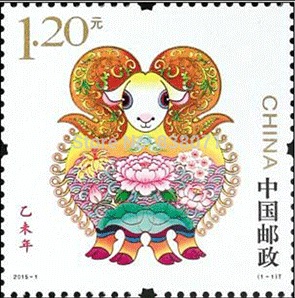
Happy Year of the ? 祝羊年快乐!
read on the web | skip to the calendar
Tonight is the eve of the lunar new year. We hope that you and those you care about have a great holiday and that the Year of the 羊(yang)is a great one for all of us. So is this the year of sheep? The year of the goat? The year of the ram? You'll see all of these animals represented in the lunar new year stamps issued by Asian nations, not to mention those issued elsewhere in the world.
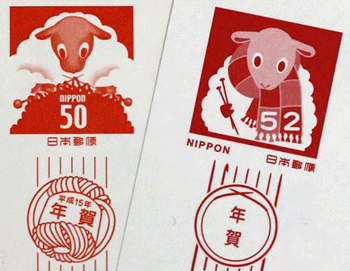
Since we're the U.S.-China Institute, we ordinarily begin our lunar new year stamp collection with stamps issued by those countries. But this year, pride of place has to go to Japan. As you know, the cycle takes twelve years. In 2003, the Japanese postal authorities issued this printed card, a clever design with a sheep knitting something. This year our sheep is sporting a nice new scarf.
Japan, incidentally, issued the first of its lottery new year's greeting cards in 1949. The People's Republic of China did not begin issuing new year stamps until 1980. This, in fact, was a major undertaking. The Chinese Communist Party officially promoted a break from traditional ways, ending family-centered farming and business. When the Cultural Revolution was launched in 1966, one of the targets for destruction were the "four olds" 四旧:old customs, old culture, old habits, and old ideas. The government cancelled the three-day lunar new year holiday in 1967. People were told to not observe the new year in the usual ways, but to embrace the ideals of the Cultural Revolution. Lavish meals, firecrackers, and so on were out; frugality was in. Instead of hanging traditional couplets at their doors, people were to recite the political slogans of the day.
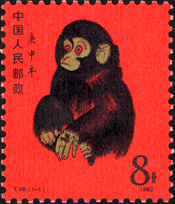
It was only after Mao Zedong's death and the consolidation of power by Deng Xiaoping that this changed. In December 1978, the CCP sanctioned a return to family-based farming through the household responsibility system. The economic reforms were underway. And in 1980, the three-day lunar new year holiday was restored and the People's Republic issued its first lunar new year stamp, a monkey painted by the celebrated artist Huang Yongyu 黄永玉.
The CCP's predecessors the Kuomintang(KMT)or Nationalists had also experimented with a break from the lunar new year tradition. In 1928, it pushed to make January 1 the main occasion for celebrations. Society pushed back and the KMT relented. By 1965, the KMT was running only Taiwan and the postal authorities there issued the first Republic of China lunar new year's stamp. The U.S. began issuing lunar new year stamps in 1992.
*****
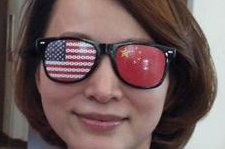 This evening, most Chinese television viewers will tune in the Spring Festival Gala on CCTV. Dong Qing 董卿 is returning to host the program after a stint as a visiting scholar here at USC. The party-state agenda continues to drive the celebration. CCTV says anti-corruption messages will be highlighted during the program.
This evening, most Chinese television viewers will tune in the Spring Festival Gala on CCTV. Dong Qing 董卿 is returning to host the program after a stint as a visiting scholar here at USC. The party-state agenda continues to drive the celebration. CCTV says anti-corruption messages will be highlighted during the program.
****
The U.S. rolled out its year of the ram stamps in Chinese communities in several cities last week. In 2003, it issued 70 million ram stamps. To illustrate the decline in the use of stamps for postage, though probably not a decline in interest in the stamps from collectors, this year the U.S. Postal Service printed just 17.6 million year of its ram stamps. Chinese authorities went to Guangzhou, nicknamed "goat city" to launch its stamp.
|
United States(Ram) |
|
|
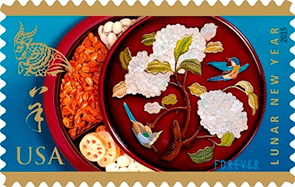 |
|
Taiwan (Ram) |
|
|
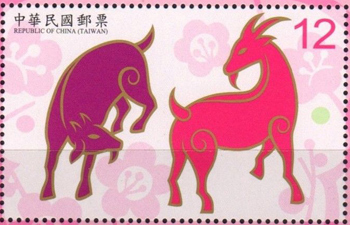
| |
|
Hong Kong(Ram) |
Macau(Goat) |
|
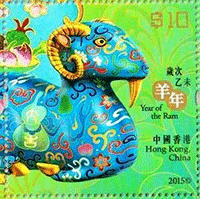 |
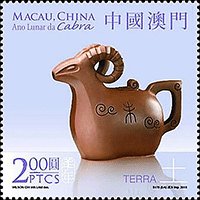 |
|
|
|
|
|
|
You'll need to go to the web version of Talking Points to see all the other lunar new year stamps. We have stamps there from every continent, but just to tempt you just a bit more, here are two favorites.
New Zealand(Sheep, of course, since the country has 20 sheep for each of its three million people)
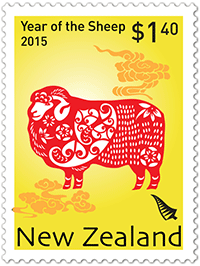
Ghana(Goat)
Ghana chose to mark the year of the goat with paintings by the great Qi Baishi(1864-1957). This will no doubt make the stamp a favorite among Chinese collectors, but also perhaps among those entrusted with "guiding public opinion." One of China's heavily promoted films last year was The Story of Mao Zedong and Qi Baishi(《毛泽东与齐白石》)featuring Tang Guoqiang and Liu Zifeng in the lead roles. The film depicted Mao and the new Communist-led government as being concerned about the well-being of artists and intellectuals.Tang joined us and talked about "being Mao" when the film was screened here as part of the Chinese American Film Festival.
|
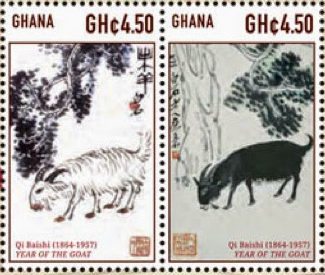
|
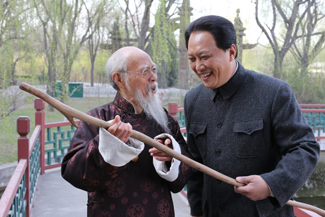
|
After you've looked all the stamps over, please use Twitter, Facebook or email to let us know which one you like most.
*****
Upcoming USCI events include a March 4 presentation by author Mike Meyer on In Manchuria, his new book. Meyer's The Last Day's of Old Beijing is among the most popular work on how people have experienced the rapid changes of the past decade. On April 3 at the Shangrila Pudong Hotel in Shanghai, we are hosting a symposium on the values and attitudes of Chinese and American young people. We hope that you'll join us in Los Angeles or Shanghai.
 In the meantime, please drop by our web magazines, US-China Today and Asia Pacific Arts. APA has launched its Bullet Train podcast. The latest episode involves a search for lunar new year jokes.
In the meantime, please drop by our web magazines, US-China Today and Asia Pacific Arts. APA has launched its Bullet Train podcast. The latest episode involves a search for lunar new year jokes.
Our calendar below covers events and exhibitions across North America. Please share Talking Points with friends. And please subscribe / like / follow us at our social media pages. The links are below. We are always delighted to hear from you at uschina@usc.edu

USC Events
Please join the USC U.S.-China
Institute for a vivid and insightful portrait of China today, as featured on
NPR's This American Life, from the acclaimed author of "The Last
Days of Old Beijing."
3/4/2015 - In Manchuria:A
Village Called Wasteland and the Transformation of Rural China
Social
Sciences Building, SOS B40
University of Southern California
Los
Angeles, CA 90089
Time:
4:00 - 5:30PM
For
three years, Michael Meyer rented a home in the rice-farming community of
Wasteland, hometown to his wife's family. Their personal saga mirrors the
tremendous change most of rural China is undergoing, in the form of a privately
held rice company that has built new roads, introduced organic farming, and
constructed high-rise apartments into which farmers can move in exchange for
their land rights. Once a commune, Wasteland is becoming a company
town.
Amplifying the
story of family and Wasteland, Meyer -- via photographs -- will take us on a
journey across Manchuria's past, a history that explains much about contemporary
China-from the fall of the last emperor to Japanese occupation and Communist
victory. Through vivid local characters, Meyer illuminates the remnants of the
imperial Willow Palisade, Russian and Japanese colonial cities and railways, and
the POW camp into which a young American sergeant parachuted to free survivors
of the Bataan Death March. In Manchuria is a rich and original chronicle of
contemporary China and its people.
The book will be available for purchase at the
event.
About the Speaker
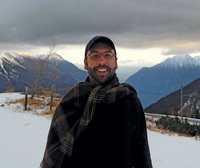 Michael Meyer first went to China in
1995 with the Peace Corps. His first book, The Last Days of Old Beijing:Life in
the Vanishing Backstreets of a City Transformed resulted in a Whiting Writers'
Award for nonfiction, as well as a Guggenheim Fellowship. Meyer has also
received a Lowell Thomas Award for excellence in travel writing. His stories
have appeared in the New York Times, Time, Smithsonian, Sports Illustrated,
Slate, the Financial Times, the Los Angeles Times, the Chicago Tribune and on
This American Life. Meyer is an Assistant Professor of English at the University
of Pittsburgh, where he teaches nonfiction writing.
Michael Meyer first went to China in
1995 with the Peace Corps. His first book, The Last Days of Old Beijing:Life in
the Vanishing Backstreets of a City Transformed resulted in a Whiting Writers'
Award for nonfiction, as well as a Guggenheim Fellowship. Meyer has also
received a Lowell Thomas Award for excellence in travel writing. His stories
have appeared in the New York Times, Time, Smithsonian, Sports Illustrated,
Slate, the Financial Times, the Los Angeles Times, the Chicago Tribune and on
This American Life. Meyer is an Assistant Professor of English at the University
of Pittsburgh, where he teaches nonfiction writing.
Avoid traffic and get to USC by taking the Metro's Expo
Line. Get off at the Jefferson/USC stop
for a short walk to campus. Visit the website for more
information.
Driving Directions to
Campus
For maps and directions to campus, visit the University Park Campus Map & Driving
Directions page.
Suggested Parking($10 on
campus):
Parking Structure X(PSX)
Enter at the Figueroa Street Entrance
at 35th Street(Entrance 3)
4/16/2015:Plus ca change? Propaganda and thought work
in the Xi Jinping era
 Annenberg School of Communication and
Journalism, ASC 204
Annenberg School of Communication and
Journalism, ASC 204
University of Southern
California, Los Angeles, CA 90089
Cost:Free, click here to
RSVP.
Time:4:00PM - 5:30PM
The USC U.S.-China Institute
presents a talk by Anne-Marie Brady from the University of Canterbury to discuss
the trends in contemporary propaganda and thought work under the Jiang and Hu
eras.
USC U.S.-China Institute | 3502 Watt Way, ASC G24 | Los Angeles | CA | 90089
Tel:213-821-4382| uschina@usc.edu | china.usc.edu


















